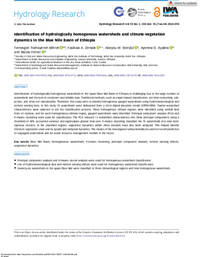Identification of hydrologically homogenous watersheds and climate-vegetation dynamics in the Blue Nile Basin of Ethiopia

Authors:
Identification of hydrologically homogenous watersheds in the Upper Blue Nile Basin of Ethiopia is challenging due to the large number of watersheds and the lack of consistent and reliable data. Traditional methods, such as expert-based classification, are time-consuming, subjective, and often not reproducible. Therefore, this study aims to identify homogenous gauged watersheds using hydrometeorological and remote sensing data. In this study 76 watersheds were delineated from a 30-m digital elevation model (SRTM-DEM). Twelve watershed characteristics were selected to aid the classification process. Three homogenous climate regions were identified using rainfall data from 42 stations, and for each homogeneous climate region, gauged watersheds were identified. Principal component analysis (PCA) and K-means clustering were used for classification. The PCA reduced 12 watershed characteristics into three principal components using a threshold of 80% accounted variance and eigenvalues greater than one. K-means clustering classified the 76 watersheds into nine homogenous clusters. In the classified regions, vegetation dynamics within three decades have also been analyzed. This helped identify trends in vegetation cover and its spatial and temporal dynamics. The results of the investigation will potentially be used for runoff prediction of ungauged watersheds and for water resource management models in the future.
